How can you sustain a high level of performance over time?
My guest today on The Courage of a Leader podcast is Sue Firth, a business psychologist, performance, coach, and a leading authority on stress, resilience, and wellbeing; and Sue is here to tell us that healthy habits are at the core of the answer!Sue brings us very practical and effective ways of shifting our habits to lower stress and the stress chemicals in the body and to truly be able to refuel and continue to perform well.
You’ll love her thinking and her practical guidance that you can truly implement right away.
About the Guest:
Sue Firth is a Business Psychologist, Performance Coach and a leading authority on stress, resilience, and well-being. She is also an author and helps CEOs and senior executives manage their work, life and become more resilient. She works both with groups and individuals.
Sue is an international speaker and presenter and holds both a Batchelor of Science and a master’s degree. She is a member of the British Psychological Society and The Health Professions Council. Sue regularly appears in the media and press, has an established social media following and has been a guest/expert on ITV and the BBC.
She runs a private practice in Cambridge, and 58 South Molton Street, London. Sue aims to make a difference to the way people think and to teach them how to moderate their own habits to reduce any difficulties they have, whilst still maintaining their effectiveness. With extensive experience in consulting at strategic level for both the management of change and the implementation of stress programmes to support employees, she is well placed to offer insight to guide people. Used to professional speaking, she regularly travels abroad as well as frequently working with medium to large corporates in the U.K. She is an expert in Leadership Resilience and Sustainable Performance as she has recognized the need to enhance a person’s attitude and approach when working in high pressure situations.
She has worked with many high-profile corporate clients including National Grid plc, Lloyds Bank, Curry’s, and Seddon Construction. She’s also worked with Sun Microsystems, and British Aerospace in the past. She has written several books including ‘More Life, Less Stress’, ‘Taking the Stress out of Leadership which are available on Amazon, and ‘Understanding Relationships’ available from her site. She regularly appears on the Radio and television and runs her own podcast, The Executive Edge.
The best way to reach Sue is by email, sue@suefirthltd.com
About the Host:
Amy L. Riley is an internationally renowned speaker, author and consultant. She has over 2 decades of experience developing leaders at all levels. Her clients include Cisco Systems, Deloitte and Barclays.
As a trusted leadership coach and consultant, Amy has worked with hundreds of leaders one-on-one, and thousands more as part of a group, to fully step into their leadership, create amazing teams and achieve extraordinary results.
Amy’s most popular keynote speeches are:
- The Courage of a Leader: The Power of a Leadership Legacy
- The Courage of a Leader: Create a Competitive Advantage with Sustainable, Results-Producing Cross-System Collaboration
- The Courage of a Leader: Accelerate Trust with Your Team, Customers and Community
- The Courage of a Leader: How to Build a Happy and Successful Hybrid Team
Her new book is a #1 international best-seller and is entitled, The Courage of a Leader: How to Inspire, Engage and Get Extraordinary Results.
https://www.linkedin.com/in/amyshoopriley/
Resources mentioned in the podcast
The Inspire Your Team to Greatness assessment (the courage assessment).
How can you inspire our team to be more proactive, take ownership and get more done?
You demonstrate and empower The Courage of a Leader. In my nearly 3 decades of work with leaders, I’ve discovered the 11 things that leaders do – even very well-intentioned leaders do – that kill productivity.
In less than 10 minutes, find out where you’re empowering and inadvertently kills productivity, and get a custom report that will tell you step by step what you need to have your team get more done.
https://www.courageofaleader.com/inspireyourteam/
Magnesium
https://www.walmart.com/ip/Epsoak-Epsom-Salt-5lbs-100-Pure-Magnesium-Sulfate-Made-in-USA/121668140 (this is from Walmart, but any large store or Amazon would stock them)
Because this product is best used in the bath, if you don’t have a tub, you may prefer to take it in powder form. In which case, use a spoonful in about half a glass of water 30 minutes before bed. Here is a link: https://www.amazon.com/magnesium-oxide-powder/s?k=magnesium+oxide+powder
European source:
Thanks for listening!
Thanks so much for listening to The Courage of a Leader podcast! If you got inspired and/or got valuable leadership techniques you can use from this episode and think that others could benefit from listening, please share using the social media buttons on this page.
Do you have questions or feedback about this episode? Leave a comment in the section below!
Subscribe to the podcast
If you would like to get automatic updates of new The Courage of a Leader podcast episodes, you can subscribe to the podcast on Apple Podcasts. You can also subscribe in your favorite podcast app.
Leave us an Apple Podcasts review
Ratings and reviews from our listeners are extremely valuable to us and greatly appreciated. They help our podcast rank higher on Apple Podcasts, which helps us ignite The Courage of a Leader in more leaders! Please take a minute and leave an honest review on Apple Podcasts.
Teaser for next episode
Up next! The Power of Perspective and Innovation to Lead More Boldly and Brilliantly with Rich Walker. Stay tuned to find out how you get out of the swirl of busyness and cynicism that it’s so easy to get into these days, and how you can set aside doubts and lead more boldly!
Transcript
How can you sustain a high level of performance over time? Sue Firth, business psychologists performance coach and a leading authority on stress, resilience and well being is here to tell us that healthy habits are at the core of that answer. Sue brings us very practical and effective ways of shifting our habits. I was furiously taking notes during this recording, to lower stress and the stress chemicals in the body. And to truly be able to refuel and continue to perform well, I think you will really enjoy her pragmatic and science based approach. I'm glad you're here to listen.
Amy Riley:Welcome to the Courage of a Leader podcast. This is where you hear real life stories of top leaders achieving extraordinary results. And you get practical advice and techniques, you can immediately apply for your own success. This is where you will get inspired. And take bold, courageous action. I'm so glad you can join us. I'm your host, Amy Riley. Now, are you ready to step into the full power of your leadership and achieve the results you care about most? Let's ignite the Courage of a Leader.
Amy Riley:Sue, I am so glad that you're here with me today on the Courage of a Leader podcast. Thank you for your time.
Sue Firth:Oh, you're welcome somebody to be here.
Amy Riley:Yes. And we're talking about something today that is so important, and has been missing on the courage of a leader podcasts. So I am glad you're here to fill a gap. Okay, we all know that there is stress in our workplace, today's and leaders have so many ways big and small, that they can support their team members and their colleagues to operate with healthy mindsets, healthy habits, right so that we can have sustainable performance over time. So we're gonna be talking about how to have sustainable performance through healthy habits, right with our focus on the workplace. So so how do you recommend that we start thinking about health related habits?
Sue Firth:Yeah, I love that. And thank you. So I'm a psychologist, and I've been talking about this subject for 30 plus years. And I think where executives have some really effective habits, but some which aren't so healthy for them, is that when they start to hit a level of stress, unfortunately, instead of stepping back, pulling back and just recharging, they tend to lean in. So the difficulty with them leaning in is they are more likely to burn out under those kinds of circumstances. Because if something needs them to respond, they tend not to have a fallback second plan of how they'll do it. It's a very strong driven focus Personality Typing. So the first thing I would say to you really is, please appreciate from this podcast that you need to put yourself higher up the list of priorities. And there is a very simple reason for that because you matter. And I know you think that too. But I'm not certain that you actually know how much and therefore nothing is gained if you are overworked, overwrought and overtired. But a great deal is gained. If you can appreciate some of the stuff we want to talk about today. And then conserve your energy better than that. Yes,
Amy Riley:I want to underscore that Sue. So often, when we get in a time crunch, we have that heavy workload, right? We got to push we got to push we got to push we got to lean in, we got to make sure we got to get focused, and it can feel counterintuitive, in that moment, to pause to step back to consider how to take care of ourselves or even stop and prioritize and figure out. So knowing that that's the human tendency, and knowing that we're going to have to intentionally interrupt that and do something different. put ourselves first. It's
Sue Firth:important. I mean, it really is. I mean, I think there's a very simple reason why we do this. Often there are some very strong personality traits. These are great sayings. There's absolutely nothing negative about them. But what comes with the territory is because we're competitive and often perfectionist, we don't know when to stop. So Some of the difficulty is we simply turn into harder workers thinking that hard work will solve the problem. And it does. To some extent, it will get through our to do list. But one of the things that might be worth pausing every now and again is say, okay, should this be done by me. So instead of that we just push straight in, and then just get it done. And of course, that makes logical sense. And if you are super up against it for time, then learn from that maybe at your next opportunity step back and say, Okay, how can I actually learn from that experience, and what would I do differently. And although that's blindingly obvious, I'm still saying gives out a few minutes of your time. And therefore, if you can do that's the first thing, the second thing is, please do not drop your hobbies. It is extremely typical that people stopped smiling, they stopped working out, they stopped meeting up with friends in order to go play that squash game or whatever it is. And these are actually your safety valves. These are your decompression moments bearing in mind something which is terribly important, executives do not decompress more than five to 10% every evening. And then they simply come back at full throttle again. So weekends are not decompressions. So it's extremely important for you to know that if you only go on holiday, twice a year of any substance, it will take you the first five days to decompress. So this is from long standing experience of 30 plus years of working with execs, they simply don't do it well. So sustainable performance is about going away or pressing the reset button every six weeks bare minimum. So when you do that, that means either a Friday to Monday or a Thursday to Sunday, and go do as little as possible or sit in the sunshine. Because if you're based in Florida, this is easy to do. But if you're over in the UK, you have to do this more consciously. And the other thing really is that we eliminate our boundaries, and they must come back. So we work until seven or eight at night because we think to ourselves, this is a solution. And can I please teach this is not a solution. So one of the simplest reasons why it isn't is because that will massively disrupt your sleep. And sleep is restorative at all times in all situations, but particularly for an exec to decompress. So you actually have to work the five to 10. So what that means is number 10 is as high as it can possibly get in terms of how uptight you're going to feel. So if you know you are a nine or a 10, it's absolutely critical, you start to wind down meaning do less from 6pm at night, so see the six until seven as a shift from a 10 to nine, see the seven until eight as a nine down to an eight. Can you see what I'm doing? Yeah, and see the eight until 9pm as a shift from eight down to seven, you should be getting to a five, a level five before you plan on trying to sleep. Because unless you do, you'll find your shoulders are too tight, your neck is too tight, your head is just circling like two tapes in your head. And you'll find it really, really difficult to switch that off. Now, let me just say one last thing, because you're doing such a good job of letting me talk here. Don't expect to switch off live with that tension. There is no you're grown, it's not very easy for execs to do that. And it's too much to ask of them. Expect to do less out the weekend or do things differently, but don't expect to switch off. This is the reason why I espouse the six week rule. So if you press the reset button every six weeks, you have a much better chance of being able to integrate that into a lifestyle you need to make these systematic consistent habits they become a lifestyle.
Amy Riley:Okay, I want to recap some of this Sue, because you just said a lot of great stuff. So you answered my next question was going to be when we hit stress, we don't step back. Instead we lean in and I was going to ask okay, when we step back, what do we do? Right And I'm hearing we can ask ourselves should this be done by me? Checking in on whether others can be involved in the work and then I'm clearly hearing when the workload gets heavy. When we feel stressed. Do not let go of your hobbies, you're working out all of the things that you do to take care of yourself. Right. So how do you refuel, your hobbies, your sleep, also many good things happen when we sleep Dube setting setting boundaries, and I love this and how you got really explicit about it, how we need hours we need time to wind down and to think about it that way. If we're ending our day at a 10 What do we need to do to get that to a five by the time that we're putting our heads? Pillow? Absolutely. No. I also want to hear more about this. Sue that okay? When we care about our work And we're engaged. Right? That's the I think that's part of what can lead to, we've got to live with the tension, because it's still there swirling in our minds and our bodies to some degree. So we're bringing it down to another level over the weekend in the evenings. But that tension is not fully going away. Can you say more about living with that tension?
Sue Firth:Yeah, that's a really good point. I mean, thank you. So one of the things, which I think I'm trying to say is that the body holds your tension. So you've got to work that out somehow. Now, you can do that really simply, by going for a walk, taking the dog, having some time to yourself sitting on a beach on a rock, you can do this with the kids, you can sit down and do something Uber's simple. So when I say that, I mean, sit down and do a jigsaw puzzle, do not do anything that's too exacting for the brain. So basically, you're swapping out the level of intensity of what you're doing. So you do less intense things. Okay. The other thing, which I think is terribly important is, please try to get some of that chat inside your head out. Now, what that means is psychologists are strong believers in both good times, and tough times that you are better if you write it down. Now, what that might mean is something as simple as on a Friday before you go back to home, write down anything that's remaining. But I'm quite a strong believer, actually, to swap that out, if I may. I'm quite a strong believer instead, on writing what I would call and I'm just going to show you this, this is my wins journal. So we are this every day. But on a Friday, I then can encapsulate the top three wins of the week. I do not write anything else down on a Friday evening, if there's anything left for me to do, I will only circle back around to that Sunday night or first thing Monday morning. And therefore I am not winding my system back up again, going into work mode, as I call it until Monday morning. But you did say something really good. And I think that's very important AMI, if you are enjoying this intensity, there is usually much less impact of that in relation to the stress response, then there is if you are not enjoying a phase, so if you like working hard if you like working long hours, if you're creative with it, if you're productive, this is not necessarily a bad thing. It's just that you can't expect the body to come up with significant levels of adrenaline 24/7 like that and not get tired. Yes,
Amy Riley:so many great things you just said there to work it out. Like exercise, go for a walk, give yourself a break, do that puzzle, do something that's less intense. Find a way to get that chatter that swirl that is in our heads out. I know sometimes I'm thinking about different projects, different things. And it's just like, if I could just pause for a minute and write down some notes. Right now I know it's captured on a piece of paper. And I don't have to keep it swirling around my mind. But also, you pointed out something very important Sue, right like so often during the week and can be a best practice on the end of the workday Monday, let me capture the things that I didn't get to that I want to be at the top of my list for Tuesday. But that winds us back up. Right. So on a Friday afternoon, let's focus on the winds and a sense of satisfaction going into the weekend rather than what do I have to do next week? Oh, that it's part of my process to do that Sunday night or Monday morning. So paying attention to those energetic shifts. Okay,
Sue Firth:don't get lost. You see, the reason why I'm why that I'm espousing This is because it's so important. We're talking chemistry here. We are talking fundamentals of chemistry. But we're not just talking adrenaline, adrenaline and cortisol are the primary drivers in your system. And they are related to what we have all colloquially known as the stress response. But it's far more complicated than that. There are many other chemicals that actually their hormones more accurately, I've just come to, for some reason refer to everything as a chemical. It's just a generic term. But those hormones are not all produced by the brain. Some of them are produced by the guts, and therefore they drive quite a lot of this sustainability that we're looking at. They will drive you towards certain types of foods, they will drive you to sugar, they'll drive you to all sorts of crutches that you need, or you will think you need in order to be able to sustain your day. So the more you actually invest in what's going to be producing serotonin, the stronger and better and more positive you experience life as being and that's what feeds the success driver in you. Because it's curious, really Amy I find Far too many exhibits do not feel a success. And yet they have proof or evidence staring them in the face that they're doing a good job.
Amy Riley:Oh, yes. So it's so easy to see the gap that's in front of us, rather than the gap that we have closed behind us and celebrating that and making sure that we're giving sufficient attention to that. Yeah. And all of that affects what's going on in our brains and our bodies and what all chemicals are being released. So I have so many follow up questions, but I want to tell listeners more about you. Sue Firth is a business psychologist, performance coach, and a leading authority on stress, resilience, and well being as why had to get here get her here on the podcast. She's also an author and helps CEOs and senior executives manage their work life and become more resilient. She's an international speaker, host of the podcast, The Executive Edge, and is a member of the British Psychological Society and the Health Professionals Council. Sue aims to make a difference to the way people think and to teach them how to moderate their own habits to reduce any difficulties they have, while still maintaining their effectiveness. With extensive experience and consulting at strategic level for both the management of change and the implementation of stress programs to support employees. She is well placed to offer insight to guide people. Sue regularly appears in the media and the press. And she has been a guest and an expert on ITV and the BBC. Thank you for spending time with us today on the Courage of a Leader podcast. You're
Sue Firth:also welcome, honestly, I mean, I'll be honest with you, any excuse just pointed me towards you know, any excuse to be able to talk about this. It's just who I am. I think I just I love it. So you know, this, this should be stressful, but for me, it's not.
Amy Riley:Very good. Well, let's go there. So we've already hinted at this idea that when we're working in our strengths, more working in our passions, something that we care about, that's healthier, that we can get more of that serotonin and oxytocin chemicals being released. This is your passion. Can you say more about your passion and working in this work? Yes,
Sue Firth:we pleasure. I mean, when I do my session on taking the stress out of leadership, I nearly always take them through the model. And the model, if you like, is a visual graph, but we call it the chemistry of performance. And at the top is the role of adrenaline has, which they predominantly know a lot about. So I don't spend lots of time on that. But where I do explain that it's counteracted in a favorable way by the production of serotonin, it's almost like do you know that one end of the graph to the other, but serotonin is not produced by accident, it's actually produced at night, during the time that you sleep it's used when you're exposed to daylight. So one of the difficulties you've got is if you don't sleep particularly well, you cumulatively impact how much serotonin you will make. But the other thing, which is quite important is that your gut makes 80% of it. So if you don't have a good microbiome, if it's very disrupted, if you are not ingesting food, particularly frequently, if you're not absorbing your nutrients, because you don't take in that variety, and we're all hearing about this left, right and center, you may not realize it's actually likely to impact the brain, far more than you know, when you cause you need serotonin, and it's sidekick DHEA, which has a long winded title, no one will want to remember it, but it's dehydroepiandrosterone DHEA for short. And essentially, we get a lot of this from our food, but it's primarily processed in our gut. Now, unfortunately, if you're waking up in the morning, and you're not in a good headspace, you will instead veer over to the left, which predominantly produces cortisol, and that's your backup stress chemical in order to be able to sustain the exposure to stress for the day. A lot of people don't even realize how much they're living on cortisol. And you can always tell because if if somewhere on your muscles in the back of your shoulders, you're creaking and squeaking and there is almost like grated glass as you move your neck that it's definitely living on cortisol. Now it's not the end of the world. But what you need to do is either soak in a bath with magnesium salts in it because that's the fastest way to dissipate that cortisol because magnesium is absorbed through the skin. Or you can actually take it in oral form and we'll stick that into the podcast notes for you so that you find that it's actually almost more available over in the US than it is here. Okay.
Amy Riley:Oh, Sue, I'm so glad that you just shared with us what you did because I Think in so many conversations about the chemicals in our brains and bodies. When folks talk about getting serotonin into our systems, they just talk about having those connections and leadership moments, right? Yeah, like, support a colleague, you know, listen to someone as they're having a stressful time. Those are opportunities to release that serotonin. But what we're missing is, you need sleep to produce this. You need healthy nutrition for your gut to be able to release that process that in the moment, and then we can have these moments where serotonin is released, and metabolizing that cortisol? Absolutely. And I hadn't heard this the magnesium. And getting in a magnet is
Sue Firth:a big game changer. Oh, yeah, it really is. It's a game changer. And the reason why is because you will find if cortisol is stuck in those muscles, then it's very tight in the nodules, and it's painful. So if somebody actually, you know, if you want to throw money at the problem, go for a really good sports massage, by all means it will hurt at the time you go, but my goodness, your benefit two or three days later, but what you don't realize is that as soon as that Cortisol is released, it has nowhere to go, unless you dissipate it with the use of magnesium. And the reason why is because every single muscle in your body utilizes magnesium by and par for the course. But as soon as you're under stress, it stops doing that, in which case, it just eliminates what it's got. Now, once it's eliminated your levels of magnesium, you don't replace those unless you eat it, or unless you are good at absorbing, which is why you need to supplement it. You don't need to do this regularly. Just either sit in the bath for 20 minutes or so lovely warm bath white down to the tops of your shoulders. So I'm really talking about being you know, soaking, if you've only got a hot tub, stick the whole darn thing in there, you know, just sitting there, it's not going to do you any harm. It won't do anyone else any harm. And it will be the beauty is your sleep like a baby, trust me, oh,
Amy Riley:I'm thinking the sports massage and magnesium salt bath is the nice perfect combo. I want to come back to something you said earlier, Sue. And I think listeners might be curious about this as well, how we plan our downtime. It's so so many of us. And this is especially the case in the US Sue, that folks might just have one week of vacation in the first half of the year, one week of vacation in the second half of the year. And if I'm understanding you correctly, we could go on those vacations, and not even get to the point where we're actually in true downtime. So you're talking more frequent, can be less days, right? Because some of us are constrained by the number of vacation days that we have, especially for an emerging leader or mid level leader. So you're talking every six weeks having an extended weekend.
Sue Firth:If you can't do now, as you say, if the number of days that you have actually got at your disposal or truly restricted, then I have full sympathy for that just take the occasional Friday off, if possible, so as to shorten your week and decompress near the end of the week. And that's a fair point. It tends to have less impact on a Monday and under Tuesday. So one of the reasons is because you are actually driving your chemistry up. And this is in general, what happens. So your chemistry is at its height once you hit what I call fifth gear, so the car that you're driving, which is the metaphor for you, as a person gets slammed into fifth gear from first thing on Monday morning, you can't then suddenly stop it on a Tuesday and expect it to drop down to first gear, it just won't do it. It will cruise and assume that you just don't you just suddenly want to go down to fourth gear. Because there's absolutely no reason why it would want you to do anything less than that. It'll expect you to have to crank back up by Wednesday. And that's usually true. So if instead you can start to adopt the same principle, I'm teaching about coming down from a level 10 987 to five, from your Thursday evening, using your Friday to begin to do that it means that your whole weekend will be a better value to you so you can still achieve something really meaningful that way.
Amy Riley:Yeah, I'm thinking being mindful of what kinds of meetings what kinds of work hits our weekly calendars. At what time put the high pressure stuff. Monday and Tuesday. Right and, and can we by Friday afternoon be doing more or if this is the right term suit, maybe more admin or menial or right like not the high stress high priority. Tasks perfect
Sue Firth:timing, do the Create Do stuff near the end of the week if you get anything that you can do, but but be particularly selective. So this is what we're really teaching today be very selective about who you see and what you do. If there's a toxic person, which I know is not a very pleasant concept, but as they are toxic to you, because they either draw a lot on your energies, or you feel really drained, when you've seen this person, client, customer, whatever you want to call it, or it's another member of the team, or heaven forbid, it's even your boss, try to be very selective about where you put that meeting, particularly if you have that Friday to look forward to, rather than saying to yourself, oh, well, I'll have Friday. But Friday won't be any good if you're super uptight. So if you end up saying your boss on a Thursday evening, at the equivalent of 6pm, you will find it very difficult, worse, actually, if that boss has a habit of saying to you, I've got something I need to talk to you about. But don't worry, we'll talk on Monday. That isn't fair. Yeah, yeah. Because that means that individual, and then usually executives in particular, are not over thinkers, because they don't get super stuck with their thinking. But they do and have, and are all very human. So we do have some catastrophic thinking errors, and one of them is catastrophic thinking, you know, so if this has happened, then it might mean something else. And then it might mean something else. And therefore we get these, this mushroom thinking, yeah, so if you're having that kind of problem, I would urge you to have a really decent but honest one to one with your boss that says Actually, can I suggest that we do this a different way, you don't have to disclose how they make you feel. But I say be very selective, and expressive with the right people and challenging how other people are treating you, you know, sent genuinely, me genuinely when people come into the practice. And they can be all ages, younger people in particular, I find that I try and say to them, there's something I need to help emphasize. You teach other people how they treat you. And so I think it's exact level, we automatically assume we've got all that taped and actually sometimes happens. And we've done this in family, we do this all over the place. So just also factor that in, try to make sure that there aren't as you so beautifully put the high stress, which may include meetings that are high individuals, the toxic that draws all those drains down, put those in at a time before you take that long reset, if you can help it.
Amy Riley:Yes, see. Okay. So I think this is a great invitation for all listeners to look at a week in your calendar, right, and map it out based on energy, and stress and toxicity. Right, let's let's get real. Where are the energizing passion projects and conversations and people? And where's the draining the toxic? The Hey, I gotta admit, that raises my stress level doesn't reduce it, and see where those are positioned in your week? And how can you set boundaries, make requests, and organize that in a way that's going to better serve you. So you're absolutely tackling some stressful stuff earlier in the week, and you're not winding yourself up at the end of the day, or at the end of the week? Really brilliant. So I often work with leaders to think about, where's your best strategic thinking time? And where do you put that in your calendar. And knowing that something's drain us and having high energy tasks on either side of it, right? To help with that energy, but really looking at the stress across our Molander
Sue Firth:you've got, you're absolutely right, you've got to be able to do an addition in your head that is a multiplication of some things. So actually, you can't be at a level 10 And then expect yourself to de stress from that fast because it doesn't happen rapidly. So unfortunately, what you'll end up doing is if you are particularly an SEO level, which is a polite term for meaning serotonin, endorphins and oxytocin, that will put you in the top right, so that means predominantly, you're an energizer you live on adrenaline and DHEA. Now, this is a good productive space to be, it's great, but it is not sustainable. 24/7 If that is your driver, then what you are is basically a dopamine addict. And there's nothing wrong with that but you love winning you love achieving you love productivity, and only those things will do. It got to be really aware of what that's gonna do to the system because you're gonna get wired and tired when you do that. So for you the decompression from 10 to five is even more important. If you are a lower right, that's the DHEA with the serotonin mix. You love the creativity. You love serotonin but you love oxytocin. And so strictly speaking, you know, you're you're doing all your stuff, which is really quite good at decompression in the first place. Okay, but you've got Although actually consciously know how you get there and keep doing those things, so that you learn from those habits, and therefore you actually invest in them. So invest in your habits in the same way, as you would run a business and a bank, you would not run a deficit, because nothing in your head will tell you that is a good way to run the business. So forgive me for being so direct that do not run your body the same way. Because it will, it will struggle. It needs sufficient input so that it can build its resources before you start to withdraw. Otherwise, you're not paying any deposits, and you're just using withdrawals. Yes,
Amy Riley:so many great things that you have shared with us, Sue. The healthy habits that we have going on all the time, our hobbies, the working out the setting boundaries, the sleeping, nutrition, those things to take care of ourselves, and then what are we doing in the moment? Right, the stress moment? Do we lean in and keep forcing and get fanatic? Right, are we able to step back? pause, take a look at what really needs to be done in this situation? And who can do it. Thank you so much for everything that you've shared with us today. Sue, really great. I know I've got some specific takeaways from our conversation. Thank you.
Sue Firth:Good. You're incredibly welcome. It's been a pleasure.
Amy Riley:Yes, absolutely. Thank you.
Amy Riley:Thank you for listening to the Courage of a Leader podcast. If you'd like to further explore this episode's topic, please reach out to me through the courage of a leader website at www.courageofaleader.com. I'd love to hear from you. Please take the time to leave a review on iTunes. That helps us expand our reach and get more people fully stepping into their leadership potential. Until next time, be bold and be brave because you've got the Courage of a Leader

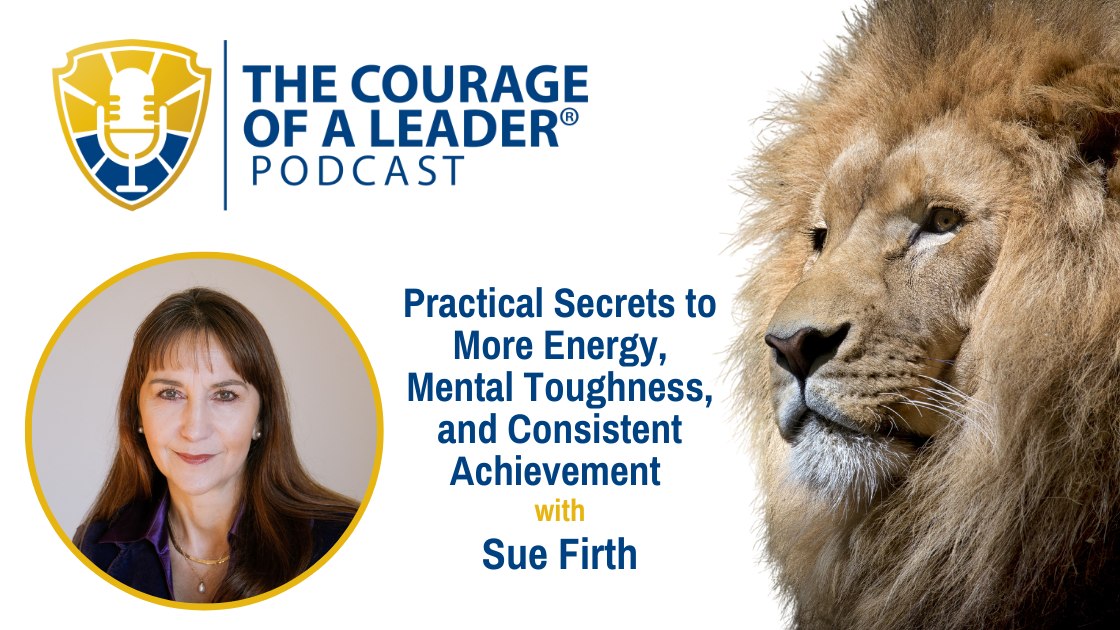
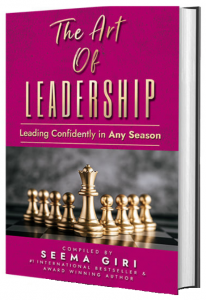
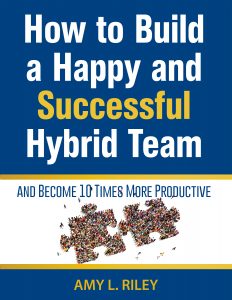
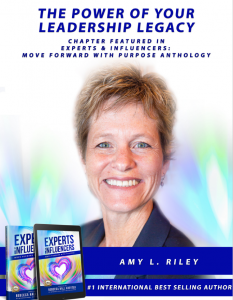

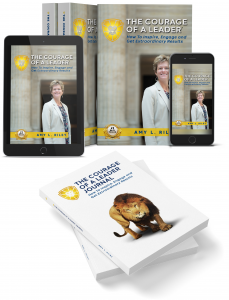

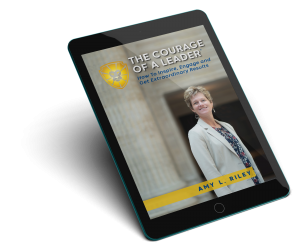
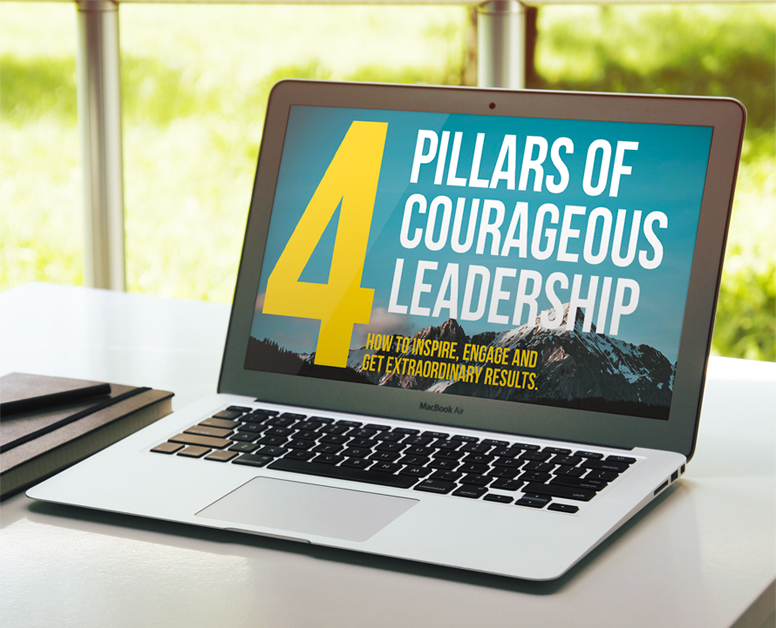 A Summary of The Courage of a Leader® 4 Pillars
A Summary of The Courage of a Leader® 4 Pillars